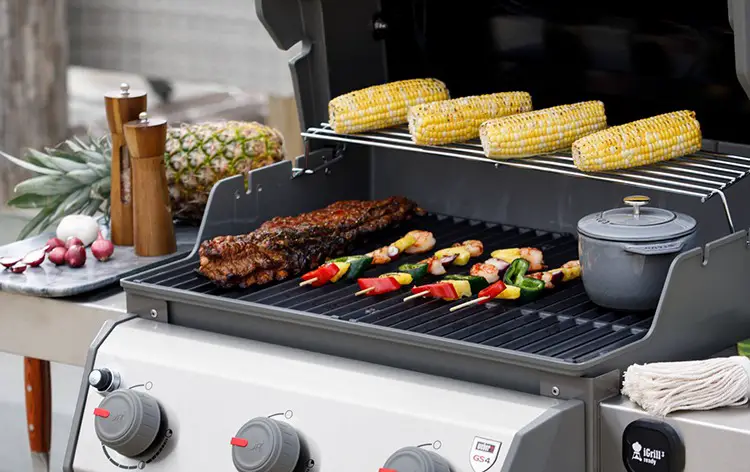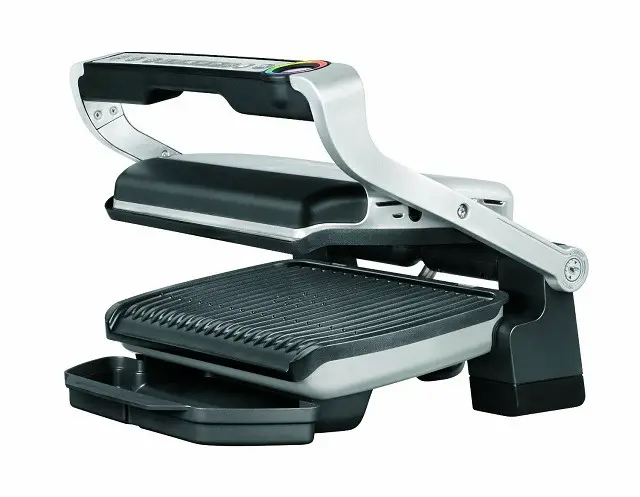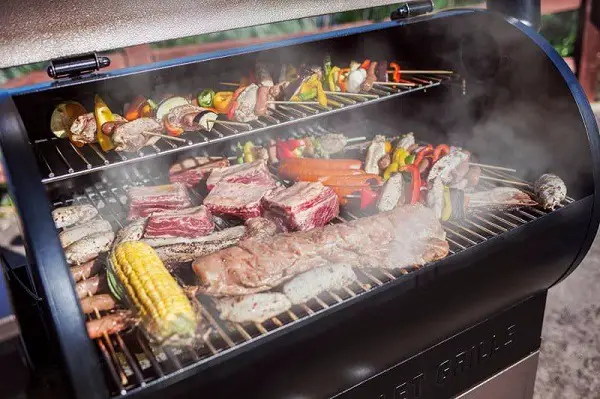The grill is one of the most commonly used cookers at homes. It cooks a variety of meals and is useful in preparing meals during celebrations or family gatherings.
There are three types of grills, depending on their source of heat that is electric grills, charcoal grills, and gas grills.
Smoking from grills is a normal part of the cooking process. However, too much smoke is unpleasant, especially when you have visitors over dinner.
Excessive smoke when combined with the flavor of the meal will interfere with the taste of the food and may result a horrible tasting meal.
Color of smoke
Just as smoke was a traditional means of communication, the color of smoke from a grill can indicate different things. This is one factor that is often ignored and can change your grilling experience.
White smoke means that the grilling of food is accurate, and that is the natural smoke from the grilling process. This is no cause for concern. On the other hand, black smoke means that the grills require some adjustments.
In such a situation, open the lid and transfer the meal to the indirect area on the grill. Afterwards, minimize the inside heat. On a gas grill, turn the knobs to medium or low temperature while on a charcoal grill, close the vents.
Why is your grill smoking?
Manufacturers Coating:
It is normal for a new grill to emit smoke. That is why manufacturers advise that you heat your brand-new oven for a few minutes to eliminate that smoke before using it.
Food remains:
This is the most common reason for smoking in grills. This may be from fallen food or overflowing liquid while preparing the previous meal. Burning and accumulation of cooking oil will produce smoke when subjected to high heat.

Cleaning products residue:
Residue from cleaning chemicals is also a reason why your grill is smoking. Burning such cleaning agents can produce harmful smoke with an awful odor.
High pressure:
This is common in gas grills. High gas pressure increases the heating flames, which in turn causes the production of smoke. This is one of the possibilities that you should look into if your grill is smoking.
Type of Coal:
This is specific to charcoal grills. Some charcoals smoke more than others and especially if the charcoal is moist. Furthermore, grilling before the coal heats and turns to gray will cause smoke emission.
A broken piece in the grill:
This occurs mostly in electric grills. When there is a broken heating piece in a grill, electric heat causes a shot in the grill, hence producing smoke. To test this, switch off the oven and switch it on again and leave it for a few minutes to check if there will be a red glow on the grill.
How to clean your grill to reduce smoking
A dirty grill is a hazardous fire risk. All that grime buildup and accumulated grease can cause unpleasant flare-ups, even full-blown infernos. Apart from being a danger to your life and house, a dirty drill will not give the food the best flavor.
It would help if you didn’t panic, though. Here are easy steps for deep-cleaning and maintaining the grill well. Because of this, your meals will taste good, and the grill will work at its best, as well as last for years.
- Disassemble
To start with, you will have to open your grill and pull it apart. By doing this, you can access the main chamber of your grill. Usually positioned below the grates, grease drippings land there and large food particles often fall into this chamber.
Begin with a cold grill. Open the grill’s hood, take out the grates, and put them aside.
Some models that use propane feature one or multiple metal heat diffusers, which rest over the grill’s burners. If the grill features these, remove them, too.
- Clearing the tubes
If you have a gas model, always check the burner tubes as they get clogged regularly. Getting reduced flame size is one sign of clogged burners.
In addition, they might burn with an orange hue rather than the standard blue. Both are a sign of an under powered grill and unusually low temperatures.
Usually, a gas grill features multiple burner tubes, although some might feature only one. You can gently clean up the tiny holes on the tubes with steel wire or nylon brush.
Remember to brush from the tube’s middle outward, moving sideways. Do not move up and down, or else, you might push debris into the hole or tubes themselves rather than clearing them.
- Cleaning up the interior
Lots of food particles and grease often collect inside the machine’s interior, also called the grill box. It is best if you use an old spatula or a good quality putty knife (plastic or metal) for scraping the grill chamber’s sides free of as much gunk as possible.
You can use any flat, thin tool. Ensure it offers the best handle to grip and surface. In addition, you may need to think about buying a pair of job gloves, as this is will likely be dirty work.
On wood and charcoal pellet grills, ash builds up within their fireboxes and coal trays are common. This, in turn, restricts air circulation and eventually affects your cooking.
When using pellet grills, ash will cause the pellet system to misfire. Sometimes this results in a dangerous over-firing situation when lots of fuel catches fire at once.
It will help if you prevent this by frequently clearing the grill of ash. Remember to do this when the ash has cooled totally.
- Put everything back together
You can then turn on the grill to its highest setting and close the hood. Your burner dials might even feature a cleaning level. After a couple of minutes, open the lid and use a non-bristle metal grill brush to forcefully scrape the grates.
At the beginning of the grilling season, a time will probably come when you need to do a deep clean. You can soak the grates in soapy water overnight to loosen carbonized, stubborn grime.
- Avoid buildup in the future
Specific particles will help in discouraging deposits of grease and dirt from forming at the start. One technique is using a bit of cooking oil immediately before you start to cook to grease the hot grill’s grates.
If your grill brush doesn’t have bristles, it’s best to scrape the hot grates before and after you grill.
Another method is using a sliced onion for scrubbing hot grill grates. The slice of onion seasons the grates while adding moisture. There’s also the release of an organic compound, which helps break down stubborn dirt and grease.
Of course, doing a full cleanup every couple of months is an ideal way of enjoying a clean grill.
Ways to minimize smoke from charcoals
As much as the smoke is a natural part of the cooking process, there are ways to minimize unnecessary smoke emissions.
Clean up the oil or grease from the grill:
Before you start preparing the next meal, it is essential that you clean up the grill to avoid the burn up of the oil and grease. Wipe off the food remains on the grill as well to eliminate any possible leftover that may emit smoke.
Rinse off the cleaning products:
Ensure you rinse of the grill thoroughly to remove any cleaning product residue. Wipe using a dry damp cloth to eliminate any traces of chemicals left behind during the cleaning process. After rinsing, dry the grill.
Reduce the heating pressure:
If the gas pressure is too high, reduce the heat by either turning the knobs or closing the vents. This will prevent excess flames that produce unwanted smoke. Further, consult your gas provider or manufacturer concerning high pressure.
Choose the appropriate coal:
As stated, there are different types of coals in the market. When purchasing coal, pick the one that produces less smoke. You can also opt for the use of coconut, which costs the same as coal.
Also, it would help if you only started cooking when the coal turns to gray. This can take around 20 minutes.
Electric grills are the best option of the grill to minimize smoke emission. They do produce smoke, though minimal and bearable compared to charcoal and gas grills.
Opt for a smokeless grill:
Technology advancements have also played a key role in trying to solve this problem. This seems to be the most practical solution.
It may be almost impossible to find a smokeless charcoal grill, but you can have one that minimizes the emission of smoke. They have a feature that prevents grease, oil, or even food traces from contacting the charcoal.
Advantages of smokeless grills/ electric grills:

An indoor grill
A smokeless grill is convenient to use indoors. Most of the modern smokeless grills use electricity, which is the most preferred energy source when it comes to dealing with smoke.
This means that you can comfortably use your grills indoors without worrying about smoke filling all the rooms in your house.
A healthier option
Smokeless grills have an in-built fan that eliminates smoke from cooking. This makes the amount of smoke released into the atmosphere very minimal.
Inhalation of smoke is harmful, especially to those suffering from respiratory diseases such as sinuses and asthma. Using smokeless grills prevents such health hazards.
Temperature control
As mentioned, smokeless grills use electricity. It is, therefore, easier to regulate the temperature of the grill compared to a charcoal grill. You can easily minimize high temperature that causes smoking.
No harmful char
Char adds to the exceptional flavor of the food. However, when oil comes into contact with charcoal, it causes smoke containing harmful substances. It comes into contact with the charred part of the meat, produces a carcinogenic substance that may cause cancer.
Easier and faster ignition and cooking
Smokeless grills are easier to ignite compared to a charcoal grill. All you need is to connect the grill to electricity to heat it.
Disadvantages of electric grills/smokeless grills:
- Increases the utility bills due to the high cost of electricity used when grilling
- Loses the traditional charm of preparing food, which is seeing the smoke
Safer and cleaner grilling
Many experts concur that a couple of easy steps can help in making grilling healthier, safer, and much eco-friendly. Here are some suggestions:
- Think about wind direction and location when grilling:
If you are grilling upwind from a house, you can adjust the location of grilling. Make sure you close windows if smoke from your grill is headed toward your home or neighbor’s house.
- Get propane or gas rather than charcoal:
The charcoal will produce more contaminants and smoke than gas. Charcoal flames are usually started using chemical fluids, which create extra contaminants. However, charcoal from wood is renewable, and so it might be eco-friendly ultimately.
- Minimize drippings:
You can prevent drippings from smoking by using aluminum foil as a protective blockade under the meat. Additionally, selecting meat with a leaner cut can minimize the quantity of fat dripping onto the flames.
- Pre-cooking meat over low heat:
You can do this in a microwave, oven, or skillet before using the grill for cooking. This helps in getting rid of the fat that may drip and smoke. In so doing, it minimizes the generation of airborne chemicals and contaminants that coat your meat.
When purchasing a new cooker, the elements come with some oil to prevent them from becoming rusty. This should not take a lot of time to burn off and does not usually smoke.
If the vents are emitting smoke at the back, it’s usually due to some oil or spilling of some meat juices. This should not last for a long time.
Apart from that, it may take place when there’s a build-up of fat on an element you do not use much from grilling, for instance, when you decide to use the element the fat burns and emits smoke.
Stopping a barbecue fire
Summertime means a lot of vacationing, bonding with your loved ones, fun, and above all, the food. Grilling is a must in most homes. Grilling can also turn out to be hazardous fast.
When you and your loved ones want to spend time together to grill food items, make sure you include a fire safety plan. It should have methods to put out the fire quickly and fire prevention measures.
Safety precautions when grilling
- Delaying cleaning up:
Once you’re done grilling, you should give your grill time to cool before cleaning up. For a charcoal grill, it might take a while for the charcoal to cool. For a gas grill, if you place the cover back on quickly, it can melt and possibly cause a fire.
It would help to avoid fire accidents if you used a metal pail to cautiously empty the ashes and hose down before you throw away the charcoal.
- Trimming surplus fat:
The best piece to grill meat features the best marble texture. You require that fat to help moisten the meat and provide us with the best tasting meat. But if the meat is very fatty, it can cause a fire that may cause severe injuries.
Before you cook, you need to trim any excess fat. It is always a good idea to have a spray bottle available to prevent flareups before they accumulate.
- Close check up:
Before you use your gas grill, you should check the propane tank. Though everything may appear perfectly okay, you might sometimes fail to inspect loosened hose or tiny holes that may lead to gas leakage. A leakage close to an item on fire will certainly lead to a grill fire.
- A clean grill:
Over the course of grilling, regular usage of grill pans may result in some fatty or grease particles sticking to your grill. You should use a wire brush to scrape off these toughened pieces before reusing your grill to stop grease fires. It is simplest to do while the grill is still hot.
To prevent frill flareups, perform a deep cleanup on the grill two to three times yearly.
- Keeping it outside:
Charcoal and gas grills need an open area so that you can prevent smoke build up.
To avoid grill fire from burning the home down, don’t use a grill inside the house. This will include any garages, covered patios, and sunrooms.
- Keep distance:
An out of control fire situation in a fire or gas grill isn’t a new thing. There have been many times when an out of control grill fire flamed and brought about lots of damage to the property around or those grilling.
In all these situations, it was seen that the grill was positioned in a concealed area like on the balcony, patio, and porch.
To prevent these fires, make sure you position your grill at a distance area.
- Don’t abandon it:
Grilling is dangerous and requires somebody to watch over as long as there’s fire. Usually, homes catch fire due to abandoning the grill and pets or kids knocking over the stand.
To avoid a fire, ensure you do not abandon the grill.

